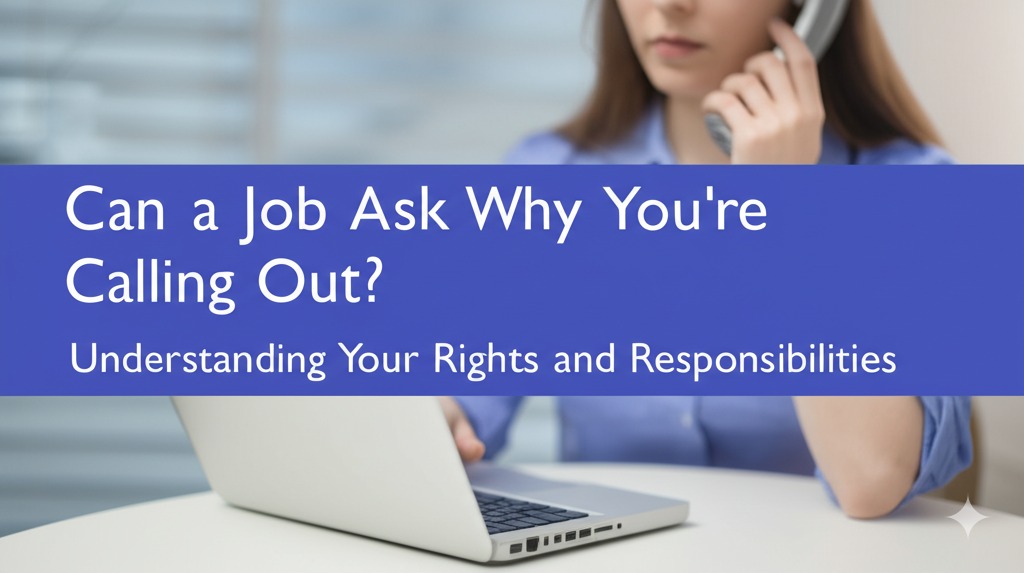
We’ve all been there – feeling under the weather or facing an unexpected personal issue and needing to call out of work. But when you pick up the phone to inform your employer, have you ever wondered if they have the right to ask why you’re calling out? It’s a question that many employees ask themselves, and it’s important to understand both your rights and responsibilities in this situation. In this article, we’ll explore the nuances of this topic, providing you with a clearer understanding of when and why your employer may inquire about your absence.
Can Your Employer Legally Ask Why You’re Calling Out?
When it comes to calling out from work, the short answer is: yes, an employer can ask why you’re absent, but there are some important caveats. Legally, in many places, employers have the right to ask for an explanation of your absence to ensure that their operations continue smoothly. However, the specific rules can vary depending on factors such as location, company policies, and whether you’re protected by any specific labor laws.
In general, most employers are allowed to ask for the reason behind your absence, especially if you’re missing work for more than a couple of days or if your job requires specific documentation for absences. For instance, if you call out sick for more than a few days, your employer may request a doctor’s note or other forms of proof to verify that your absence is legitimate.
Employee Rights and Privacy Concerns
While employers can ask for the reason behind your absence, there are boundaries. Your personal medical information is protected by laws such as the Health Insurance Portability and Accountability Act (HIPAA) in the U.S. These laws prevent employers from asking overly invasive questions about your health or demanding details about your diagnosis.
For example, while an employer can ask if you’re feeling sick and how long you expect to be out, they cannot ask you to disclose sensitive details like the specific nature of your illness unless it directly affects your ability to perform your job. In cases where you need to take a medical leave, your employer is required to keep the details of your condition confidential.
What Happens if You’re Taking Time Off for Personal Reasons?
If your time off is not health-related, you might wonder if your employer has the right to probe into personal matters. If you’re taking time off for personal reasons, such as a family emergency or a personal matter, employers generally can’t demand specifics unless they are required for company policy or if your absence impacts the business.
For example, if you need to take a personal day, some companies may simply ask you to give a general reason (like “personal matters” or “family emergency”) without going into further detail. In most cases, employers will respect your privacy in these situations, though it’s always a good idea to familiarize yourself with your company’s specific policies.
Company Policies and Your Employment Contract
An important factor in this discussion is your company’s internal policies and your employment contract. Some employers have clear guidelines regarding employee absences, and these rules may specify the types of reasons you should give when calling out.
For example, certain companies may require employees to provide a reason for any absence, even if it’s only for one day, while others may be more lenient. Always check your employee handbook or speak to HR to understand your company’s specific requirements for calling out, especially if you’re dealing with a situation where you may need to be absent for an extended period.
What Happens If You Refuse to Share the Reason for Your Absence?
If you are uncomfortable sharing the reason for your absence, it’s important to know that you can politely decline to provide specific details. However, keep in mind that your employer may still request documentation, such as a doctor’s note, particularly if you’re calling out for an extended period or if your absence impacts the company’s operations.
If your refusal to share a reason leads to complications with your employer, it might be worth seeking legal advice or speaking with an HR representative to better understand your rights and obligations. In some cases, an employer may impose consequences, such as unpaid leave or disciplinary action, depending on their policies.
When Is It Appropriate to Ask for Time Off Without Giving Details?
There are situations where employees may want or need to ask for time off without providing specific details about their absence. Common examples include:
- Personal illness or injury: You can typically inform your employer that you are sick without going into the specifics of your health issue.
- Family emergencies: If you need time off due to a family emergency, you can request leave without disclosing sensitive family matters.
- Mental health days: Employers should not require you to disclose personal mental health struggles. Simply saying you need time to focus on your health should be sufficient.
Employers are generally expected to respect your right to privacy and grant time off for personal reasons as long as it follows company policy.
The Bottom Line: Navigating Employee Absences with Respect
While employers have the right to ask about your absence, it’s important to balance this with the understanding that you also have rights as an employee. If you’re ever unsure about what’s acceptable when calling out, refer to your employee handbook, talk to HR, or consult with a legal expert to protect your privacy and rights.
Conclusion: Know Your Rights and Communicate Effectively
In summary, while employers can ask why you’re calling out, they cannot overstep boundaries when it comes to your privacy and health information. Always ensure that you understand your company’s policies, and communicate clearly and professionally when you need to take time off. Whether it’s for personal, family, or health reasons, your rights as an employee are important, and employers should respect them. If you’re ever in doubt, don’t hesitate to seek further clarification from HR or legal counsel.
If you’re dealing with a complex situation regarding absenteeism or want to learn more about your rights, consider reaching out to your HR department or consulting an employment lawyer to ensure you’re making informed decisions.

Andre Cuevas provides career insights, job search strategies, and professional advice to help individuals navigate the job market and achieve their career goals.





